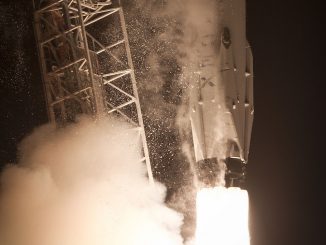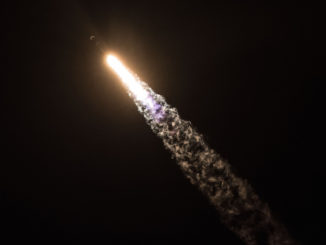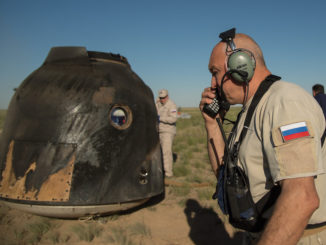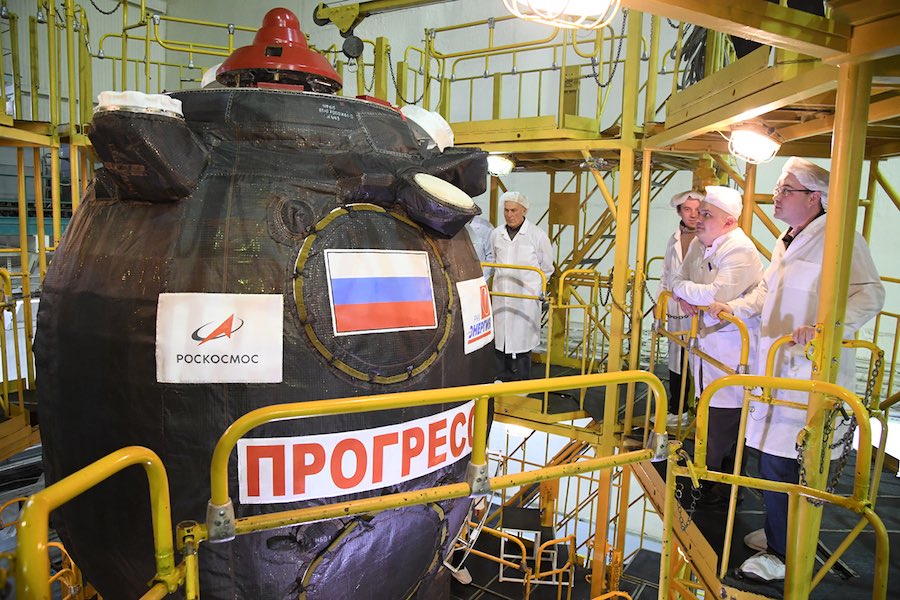
Fresh off a series of three complex spacewalks to repair a $2 billion cosmic ray detector, the International Space Station’s crew is set to receive two robotic resupply freighters in the next week after launches from Florida’s Space Coast and the steppes of Kazakhstan.
A SpaceX Dragon supply ship and Russian Progress cargo craft will deliver more than five tons of supplies, experiments and other equipment to the space station.
SpaceX’s cargo delivery mission will take off first, with liftoff on top of a Falcon 9 rocket scheduled for 12:51 p.m. EST (1751 GMT) Wednesday from Cape Canaveral’s Complex 40 launch pad. Russia’s Progress MS-13 resupply and refueling capsule is set for launch Friday from pad 31 at the Baikonur Cosmodrome in Kazakhstan at 4:34 a.m. EST (0934 GMT; 2:34 p.m. Baikonur time).
The automated Dragon cargo craft will carry more than 5,700 pounds (around 2.6 metric tons) of payloads when it takes off Wednesday, according to NASA. SpaceX plans to recover the Falcon 9’s first stage aboard a drone ship in the Atlantic Ocean northeast of Cape Canaveral.
The pressurized section of the Dragon spacecraft set for launch Wednesday has previously flown twice to the space station in September 2014 and June 2017.
The payloads aboard the Dragon capsule include more than a ton of specimens and hardware for scientific experiments, such as an investigation into flame behavior in confined spaces in microgravity.
Scientists are launching 40 mice for a study of muscular degradation during spaceflight, along with CubeSats to demonstrate new technologies in low Earth orbit. The Dragon spacecraft will carry an experiment for Anheuser-Busch to test the malting ability of barley seeds in microgravity. The company eventually wants to brew beer in space.
The Dragon capsule’s external cargo bay is loaded with a Japanese Earth-imaging instrument with high spectral sensitivity. The Hyperspectral Imager Suite, or HISUI, instrument will image Earth’s surface in 185 spectral bands, allowing scientists to distinguish between the composition and type of a range of vegetation, soil, rocks, snow, ice, and human-made objects like buildings, roads and other structures.
The HISUI instrument will be mounted to a fixture outside the station’s Japanese Kibo lab module. It’s a follow-up to the Japanese-developed ASTER instrument on NASA’s Terra satellite, which launched in 1999.
Assuming an on-time launch Wednesday, the SpaceX logistics mission will arrive at the station Saturday, Dec. 7, when astronauts will use the station’s robotic arm to capture the approaching Dragon capsule. The craft will return to Earth with cargo in early January for a splashdown in the Pacific Ocean.
The cargo mission will be the SpaceX’s 19th Dragon resupply flight since the company began operational deliveries to the station in October 2012.
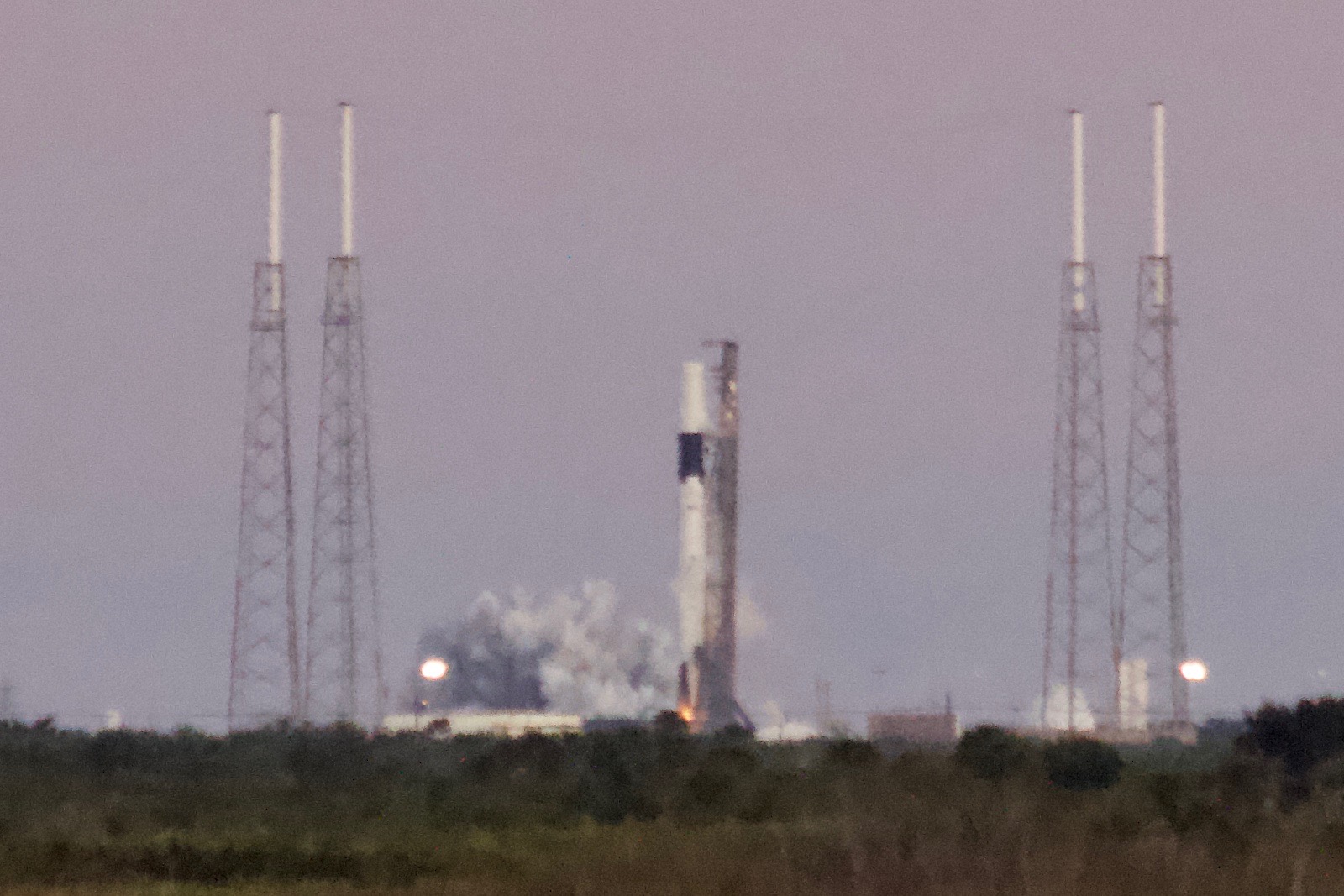
Russia’s Progress MS-13 supply ship is packed with dry cargo, propellant, water and pressurized air to replenish stocks on the space station.
Ground crews at the Baikonur Cosmodrome completed assembly of the Progress spacecraft with its Soyuz-2.1a booster Monday. The rocket will ride a rail car to Launch Pad No. 31 at Baikonur early Tuesday, where the Soyuz will be raised vertical in preparation for liftoff Friday.
The unpiloted Progress MS-13 cargo freighter is scheduled to dock with the station’s Pirs module at 5:38 a.m. EST (1038 GMT) Monday, Dec. 9. Russian cosmonauts will open hatches and unpack nearly 3,000 pounds (1,350 kilograms) from the ship’s pressurized compartment.
The gear to be delivered to the station by the Progress MS-13 spacecraft includes a new track for a treadmill used by cosmonauts for exercise.
The Progress will also pump fresh water and propellants into the station’s on-board tanks. The Russian resupply vessel is slated to depart the space station next July with a load of trash to burn up in Earth’s atmosphere.
The back-to-back cargo ship arrivals in the next week come after a busy stretch of spacewalks to repair the Alpha Magnetic Spectrometer instrument mounted on the station’s truss backbone. Astronauts Luca Parmitano and Drew Morgan performed three spacewalks in less than three weeks — most recently on Monday — to ready the instrument for the intricate repair task, then install and connect new coolant pumps.
NASA plans one more spacewalk to finish up the AMS repair effort, but that outing will be deferred after Dragon and Progress cargo ship arrivals to allow astronauts to focus on unpacking fresh supplies and scientific experiments.
Email the author.
Follow Stephen Clark on Twitter: @StephenClark1.

